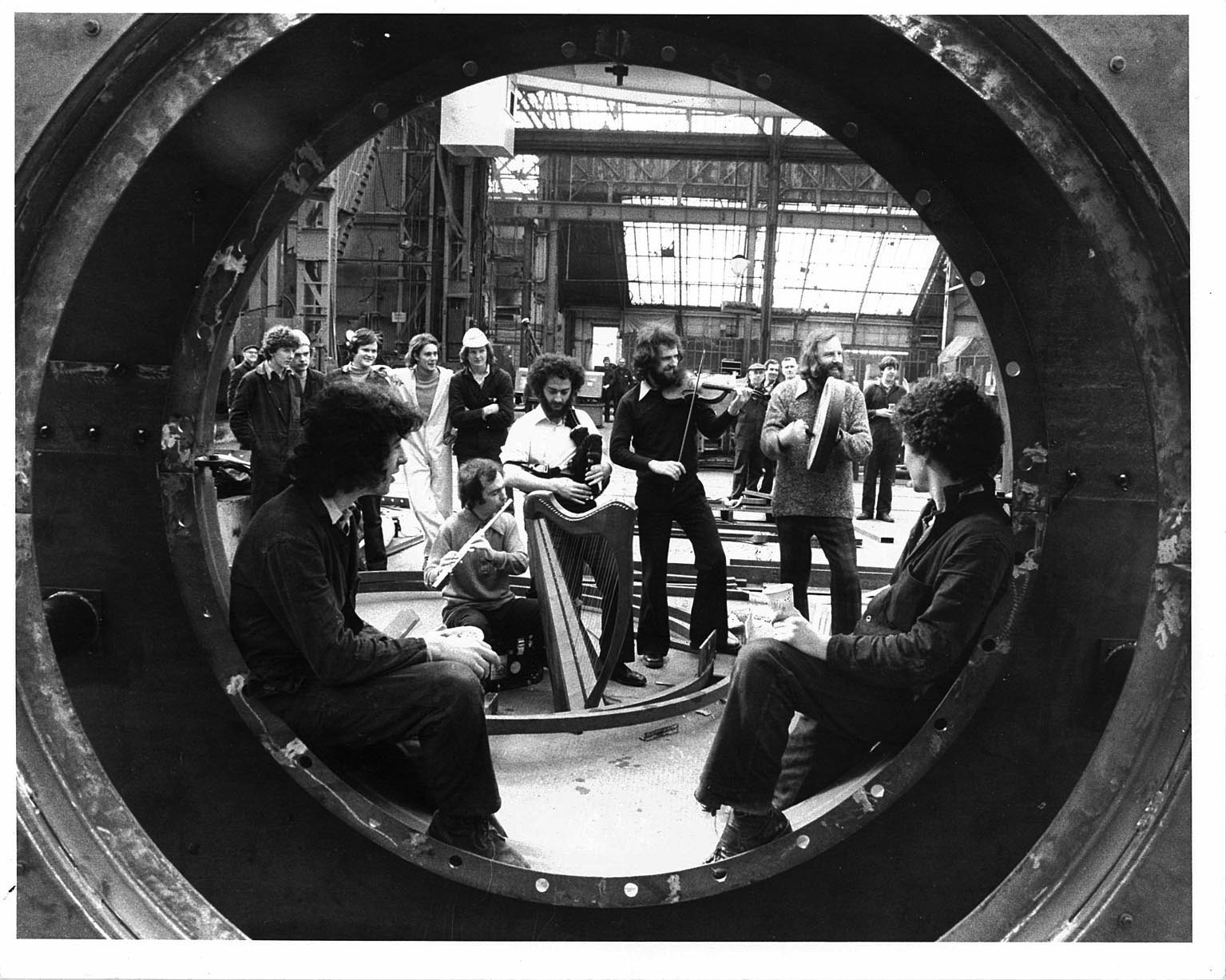A working life in the shipyards combined with folk singing, monologues and drumming…
Mick Broderick, worker and singer, remembered
WORKERS, OCTOBER 2009 ISSUE
Mick Broderick, who has died recently aged 68, will be familiar to Workers readers for his appearances over the years at the Conway Hall in London singing and drumming with The Whistlebinkies. These started with the Music for Industry concerts in the late 1980s and culminated in what was to be his final stage performance – on May Day last year celebrating the 40th anniversary of the founding of the CPB(ML).
He made a great effort to travel down from Glasgow to participate and was pleased to be able to present the new folk group he had formed with the singer and guitarist, Jimmy Watret and the fiddler and flute player who still perform with The Whistlebinkies. He had parted from them in 1995, but a reunion brought them together in 2004 for a concert on The Tall Ship which is berthed at Glasgow Harbour.
Shanties
A lasting memory that night was his rendition of the old sea shanties that his seafaring father had passed on to him. These were the songs of choice whenever he met Rod Shearman, the late London-based sea shanty exponent (who sang a couple at one of the Conway Hall concerts).
Readers with even longer memories may recall him pictured singing with the workers who were occupying McLaren’s ITT Engineering factory in an issue of The Worker (the predecessor of Workers) in early 1974. The workforce had been given redundancy notices following a strike for equal pay in December 1973. He had no hesitation in using his musical skills and wit in class conflicts, which he felt passionate about.
Looking back over his life it is not difficult to see where the groundswell of anger in his outlook came from. His comment about his birth that he “had been bombarding audiences ever since” stemmed from the devastation of his hometown, Clydebank, just a few weeks before he was born. The songs and stories he developed were fermented by all the tales of war.

|
The experiences of childhood in the midst of bleak ruins that were all too slowly rebuilt were ones he never forgot. By the age of 16 he was part of a “skiffle and comedy” group that performed in hospitals and community centres. Yet the same year, 1957, he started to serve his time as an apprentice plater – until 1962 – in Upper Clyde Shipbuilders in Clydebank. He played a part in organising the apprentices – including their strike action in 1961.
Fearless
It was in this hothouse of work and camaraderie that his future skills as a storyteller, raconteur and singer were finely honed. The now famous comedian Billy Connolly – who also worked in the yards for a time – acknowledges the inspiration he gained from Mick in those days. Mick came to folk song through an unexpected route.
In 1961 he started frequenting the jazz clubs that had grown out of several years of a revival of traditional jazz. Regular short spots were given to folk singers influenced by Guthrie, Seeger, Scots songs – and songs of protest against the American missile bases in the Clyde estuary. This enthralled Mick and together with Billy Connolly, Tam Harvey and others he became part of quite a hive of folk singing and music in Glasgow’s east end centred around the Scotia Bar – still going today.
Around 1968, Mick started to form a band of singers and players. At the suggestion of the poet Freddy Anderson, he named it The Whistlebinkies after an 1832 poetry and songbook, which had grown out of industrial Glasgow. Eight instrumentalists eventually joined and Mick made several LPs and CDs with them.
Mick had a fearless stage presence and the unusual ability to bring to silence and hold the attention of the rowdiest pub. He took his bold approach abroad too; on the group’s unique tour of China in 1991, he insisted on suddenly performing, on landing, in Beijing airport, causing a sensation. He always recounted that in Shanghai, children in the street would point and shout “Karl Marx!”, no doubt puzzled by his beard which by that time was large and greying.
He put in a memorably vigorous performance at the 1976 Festival of Political Song in the German Democratic Republic, where he recorded an LP with the group and the Irish singer Ted McKenna.
His creative side included the song March on Maggie, composed for the 1983 Glasgow to London March for Jobs, and Girl on the Island, dedicated to his late wife Irene. He was generous in his appearances at fund raising concerts such as those for solidarity with Chile and Argentina in the 1970s and 1980s, for the UCS occupation in 1971, and for the Caterpillar occupation and the miners’ strike in the 1980s.
Commitment
Mick maintained his commitment to the trade union movement to the end – as a plater in the General and Municipal Workers’ Union and joining both the Musicians’ Union and Equity as a performer.
He kept working in industry, including John Brown Engineering Ltd in Clydebank. It was while at Yarrow’s shipyard in Glasgow that he received a head injury in 1983. This and his fear of the danger of hearing damage, led him to work only sporadically in the yards thereafter, devoting more time to performing. Not many of his monologues were recorded, but some of his stories and songs have been archived on the Raretunes website.
He is survived by his sister, Anne, his step-children Mandy and Robin, by his companion Bertha and his nephew John, who was with him at the end.